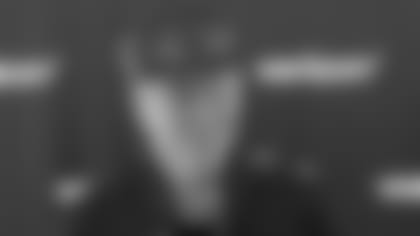Rick Smith answers a question at Reliant Stadium during a Tuesday morning press conference.
Texans general manager Rick Smith answered questions at a pre-draft press conference Tuesday morning at Reliant Stadium. The following is a transcript of his interview.
General manager Rick Smith
(opening statement) "I will start by really, I guess, applauding the efforts so far of everybody in the organization. I think our scouts and coaches have done an excellent job again of evaluating the class and assessing our needs and our team and where these guys can come in and help our football team. So I feel good about our process. It's good that we have some consistency and people understand the process, understand what's expected of them, understand how the process works and how it goes, and so it's been a good series of meetings so far."
"You know historically, traditionally, I don't get too specific about the actual players in the draft. I do think that obviously there are some players in this draft at the places where we're going to pick that we're going to have some opportunities to fill some areas that we feel like we need to improve on our football team so I do feel good about that spot as well as depth across some other positions that we need."
(on if he expects the Texans' first pick to start right away) "I think from a philosophical standpoint, you should. I think the first rounder is a guy who should come in and impact your football team and be a starter. I think you should also look to add starters in the second and third round. And maybe they don't start as fast or impact your team as early as say your first rounder, but I do think that should be the expectation for the first round, second round, third round, and if you can find depth or players who have either a physical attribute late in the draft, fourth, fifth, sixth, seventh round, but maybe they have something that's a redeeming quality from an athletic standpoint and/or a football playing perspective standpoint, that they have a chance to ascend to that level of player. I think that's what you look for later in the draft."
(on adding toughness to the offense like they did when they added DE Antonio Smith, LB Brian Cushing and SS Bernard Pollard to the defense last year) "You can talk to the guys sitting behind you for me (RT Eric Winston) that might help us out on the offensive side of the ball in terms of running the ball and being a little bit more physical. But I do think, and I think you mentioned those players, I think we added dimensions to each level. And I said this before to our defense last year—you mentioned Smith up front and Brian Cushing at the linebacker level and Bernard Pollard and (CB) Glover Quin on the secondary level, so we added dimension, we added that physical presence throughout the defense last year. And so if you can continue to do that, and on our offensive side of the ball, not only it's my opinion that if you can add a physical presence but also playmakers, guys who can make plays with the ball in their hands are the way that you, that's how you win in this league. So we look to add smart, physical players, competitive players that are passionate about football and enjoy playing the game and are strong and will get after you as well. So that's the type of player that we look for across the board."
(on if the Texans will pick at #20 or trade) "Well, that's what we do now—I'm on the phone and I'm talking to a bunch of different clubs about the possibility or the potential of moving. You never know, you can't really predict that so you've got to be ready to pick if in fact the phone doesn't ring. Obviously we've moved back before and I've got some experience and some history doing that in the first round and so we're always open to those possibilities but we do feel like if we pick at 20 we're going to get a good player."
(on how many players they've worked out or interviewed) "It just depends on what you mean by that. I mean, if you put the entire process into play with respect to all of our scouts and coaches and everybody who is working on this process, it's hundreds. And obviously you go to combine and there's 300 or so guys that you're interviewing and talking to and then you've got the opportunity to bring a certain amount of players in to your facility and we've done that and taken advantage of that. So it's hundreds of players, I mean this is an exhaustive process. And it should be. And we like to be diligent and thoughtful in our preparation and we like to think that we are thorough. And so that means that you talk to an awful lot of people and you gather a lot of information. But the thing that's important is that all of the information that you gather, you've got to have it organized so that it leads you to a decision and I think our process is productive that way because I think we amass an enormous amount of information but I think we've got a process that kind of hones us in and drives us to good decision-making."
(on if their philosophy on running backs and offensive linemen changes without Alex Gibbs here) "No, it doesn't change. I think, and we talked about this maybe in Indianapolis in the press conference, about the ideal back that you look for. I think there are ideal physical characteristics that if you could draw a player up, then you would want height, weight, speed, mental, physical football characteristics. There are things that you look for by position, and then there are varying degrees of how many of those attributes guys have. So you talk about, in theory, a big physical running back, for example, who's got the size and the speed and the cutting ability and all of those things, or is he a third-down back or is it an offensive lineman who is a lighter guy who fits in the zone scheme but he's not a powerful blocker. I think what you've got to do is you've got to look at and evaluate each player individually, and then as you look at the scheme that you play, as best a guy can fit into that scheme, those are the guys that you target. So that's what we do and that's what we're trying to get accomplished. So from an overall standpoint of the type of players we're looking for, we haven't changed philosophically because Alex (Gibbs) is gone. We're looking for the same kind of guys. And again, most important is their football character and how they play the game."
(on his philosophy of need vs. value and whether that changes after a 9-7 season) "No, it doesn't change. I think you've got to approach the draft consistently, and I think what we believe is that you assess value and you set your board and you assess where you think guys can come in, where you think their value ranks and you assign that value to them by round. And if you hit the home run, I've said often times, the home run is if you can fill needs on your football team at the corresponding levels of value, then you hit home runs with guys. But you don't reach because you might need a position. And I've also said that you can't always solve all your problems in one draft or in one offseason, and so you've got to have a long-term approach. And if you have that approach and you stick to your value, I think it bodes well for you over the long run."
(on if the increase of 3-4 fronts changes how they evaluate interior offensive linemen) "The 3-4 defense has been around for a long time, and so I don't know if anybody's changing their thought process or their philosophy. I know we're not. To speculate what other folks are doing, I don't know that. We're not."
(on if they're looking for the same thing that they have in the past with guards and centers) "Yeah, and again, it goes back to the earlier comment about the ideal player. Ideally, even in a zone scheme, you want a big, strong, physical guy. Now, it just so happens that you want him to be able to bend and cut and do all those kind of things. So it doesn't change the kind of guy you look for. You're still looking for the same guy that fits your scheme."
(on physical attributes they look for in a CB) "Well, it's all of the things that you look for. When you're talking about physical attributes, the first thing that you talk about for a corner is typically speed, his hips, how well does he transition, does he get stuck coming out of a break, can he play the ball downfield, does he have long speed, so all of the things that you look for, whether it's a corner or any position. I think the things that separate guys are the same physical attributes that you look for, and to the degree that a guy can execute and perform those things relative to his position better than the next guy is what it boils down to. It's not real complicated."
(on they'll place a higher emphasis on character after off-field character issues have recently come to the forefront in the NFL) "No, character has always and will continue to be important to us. It's something that is very important. The reason as much as anything is the fact that, in our opinion, if you've got a guy that's a quote-unquote high character guy or who does things the right way, this is a pressure filled situation here. Football and this game and this league, it's hard. And when things are hard, people revert back to what they innately are. So in the fourth quarter when it's the toughest point in the game, it's our feeling that a guy who does things the right way, who is a good person and a hard worker and football's important to him and passion and all those things, he will execute in those crunch times better than the other guy. It's not just what he does off the field, because I think it's also important from a football character standpoint what a guy does when the pressure's on. We just feel like those guys are more apt to execute and perform properly than, say, another one might."
(on if he has a different mindset going into this draft compared to last year with a potential CBA and work stoppage looming) "No, not at all."
(on if they feel they need a physical cornerback with Dunta Robinson gone) "I think, again, you've got to be able to cover in this league. You like a guy that can run and change direction and is also physical. So you look for, again, the ideal kind of guy, but I don't think him leaving impacts us in that we have to get a particular kind of guy. We need a guy that can play."
(on how much importance they place on ball skills) "Ball skills are important at any position. We go back to making plays and making plays on the ball. I talked about that on the offensive side where you look for guys who can make plays with the ball in their hand. Conversely, on the defensive side of the ball, if you've got guys who make plays on the ball and have good ball skills and can come up with those turnovers, you know how valuable turnovers are in this league and in this game. So if you can find players who have ball skills and who can go and make plays on the ball and turn it over for your offense, I think those guys are very valuable."
(on want stands out about this class of cornerbacks) "I don't know if anything stands out, I just think that, and it may just be a product of college football, there's so many teams and leagues throwing the ball around a lot and so you've got to have, if you're going to have some success in college football, you've got to have guys that can cover and play and maybe that has a little bit to do with it."
(on if that should develop more pass rushers in college as well) "I would imagine that that's a logical (assumption). There are a lot of undersized defensive ends/outside linebackers. We saw that last year, we see that again this year because that's just a product of the systems and the schemes that folks are running in college football now a days."
(on how he grades past drafts) "Well, I'd like them all to be starters and Pro Bowlers so we're falling short that way but I think if you look at it realistically, what we've tried to do is we've tried to continue to build a football team and I think we've been successful in some respects and not so in others. And I think what you've got to continue to do is to—I think what's important during the offseason more than anything is to really have a good understanding of where your football team is, what your needs are and how can you go about filling those needs. And you want impact players. And I think when you look at our drafts, I think we've been able to do that and build our team. And then depth is another issue that you try to do. So we've tried to do that and will continue to do that. So I think our philosophy is good, I think our process is good, I think our personnel is good, I think we've got good scouts, good coaches who understand the scheme and the thing that, it's the yin and the yang, we're very comfortable because we've been together for some years so everybody understands the rhythm of the meeting, they understand what they are asked to do. They understand what we're looking for. And so as a leader it's my responsibility to make sure everybody continues to have a heightened sense of concentration and awareness to what we're doing because the natural tendency is to maybe get a little bit comfortable and so you don't focus as much. And so I think we've done a good job this year of continuing to focus and I think our preparation has been good so I expect us to have a good weekend."
(on what they would look for in a nose tackle) "He's got to be able to run. We like the big guy. Again, the ideal guy is a big, 300 pounder who's strong and can hold the point but also can get off the ball and get after the passer. A lot of times you're not going to get pass rush from a nose position, so really the elements that are most important is can he anchor, can he play, can he stay on his feet and run and stand and maintain the integrity of the defense from a gap system standpoint. So those are the things that we look for."
(on how effective Ryan Mathews is) "What I don't do is evaluate or really talk about individual players until afterwards and so I probably should maintain that consistency."
(on if they consider taking a developmental player) "I think, again, it all depends on where in the draft you're talking about from a developmental standpoint. But I do think, again, we'll go back to the conversation on the thought process of what do you do: do you take value or do you take need. And so, if you have rated your board and you are in a position where you don't have a player of need but there's a value and the guy might have some potential to develop, you take him. And you work him into what you're doing. But if the guy can play football, you take the football player with the right value as opposed to reaching for somebody at maybe a need position even though you don't necessarily need that position at the time."
(on his draft day process) "I'll start the day, with the draft starting late in the afternoon, early evening, I'll start in the office and probably will spend a good deal amount of time on the phone talking to clubs, and again, all of the prep work before it starts, and just making sure that if there are any loose ends, any questions on any of the guys, that we talk with the coaches and the scouts to make sure that all those questions are answered. And then we'll move down to our war room which is downstairs, the main player meeting room, and in that room we have all of our coaches and scouts and medical people and support people and so we're there and that's where we kind of run the whole thing and we've got all of our information and boards and everything that we need to make decisions down in that room."
(on if/how the thought process changes with more time between rounds) "I think what you might see is, I like the fact that you get a chance to regroup a couple times after the first round. So you may see some activity a little it more early in the second round maybe. As teams regroup Thursday night and say, 'Well we had this guy rated as a first-rounder and he's sitting there, maybe we make a move to go get him.' And maybe the same thing happens at the end of Friday night a little bit more. So you could potentially see a bit more—I think it's great for our league, I think the draft is such a big deal and has so much interest for our league and for our games, I think it's a good thing and I'm excited about it. I think it's going to be fun."
(on the running back situation with Steve Slaton and Arian Foster) "I thought he (Foster) did an effective job. I thought he showed some flashes of ability. He's a bigger back and did a nice job for us there at the end of the year. Steve has had success before on the field and I do think he's doing fine from a physical standpoint. We've got Jeremiah Johnson, we've got Ryan Moats and we still have Chris Henry. So there are some guys that are there. When you talk about Steve and you talk about the limited amount of success that Arian had at the end of the season last year, you've got some guys that you think have some potential."













